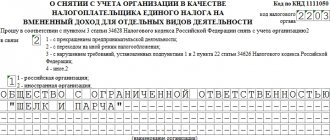What has changed according to UTII in 2020
There are two main changes from 2020:
- Retail sellers of medicines, footwear, fur clothing and natural fur products with mandatory labeling are not allowed to operate on the imputed market;
- The K1 deflator coefficient for 2020 was set at 2.005 (in 2020 – 1.915).
Please note: there will be no cancellation of UTII from 2020!
At the same time, let us remind you that organizations and individual entrepreneurs can still voluntarily switch to the taxation system in the form of paying a single tax on imputed income (UTII) for certain types of activities, provided that this special tax regime will be introduced by local governments in the region in which such activity (Article 346.26, paragraph 1, Article 346.28 of the Tax Code of the Russian Federation).
Organizations and individual entrepreneurs that meet the requirements set forth in Art. 346.26 of the Tax Code of the Russian Federation, and those registered as a single tax payer (clause 2 of Article 346.28 of the Tax Code of the Russian Federation) are required to comply with the deadline for submitting UTII and the deadline for paying UTII established by Ch. 26.3 Tax Code of the Russian Federation.
Distinctive features of the UTII system
The imputed income tax system is distinguished by the following:
- The transition to paying UTII is possible for certain types of activities, the list of which is given in clause 2 of Art. 346.26 Tax Code of the Russian Federation;
- it cannot be applied to activities that require payment of a trade tax;
- its use is available only to taxpayers with a small number of employees (up to 100 people);
- it is chosen voluntarily, can begin and cease to be used in any month of the year, and allows for the possibility of combining with other modes;
- with it you need to register and deregister as a UTII payer;
- payment of UTII by organizations involves replacing the payment of several taxes: profit tax (for legal entities) or personal income tax (for individual entrepreneurs), VAT and property tax (except for that calculated from the cadastral value);
- payment of UTII does not exempt you from paying taxes other than those being replaced and submitting reports on them;
- The procedure for calculating and paying UTII is subject to the uniform rules established by the Tax Code of the Russian Federation, requiring quarterly reporting and quarterly payment of tax.
Find out about the rules for applying UTII in the material “Who can apply UTII (procedure, conditions, nuances)”
Reporting (UTII): due date in 2020
Below are the deadlines for submitting UTII declarations in 2020:
| Period | Deadline for submitting UTII |
| 4th quarter 2020 | January 20, 2020 |
| 1st quarter 2020 | July 20, 2020 (postponement due to non-working days, quarantine and coronavirus) |
| 2nd quarter 2020 | July 20, 2020 |
| 3rd quarter 2020 | October 20, 2020 |
For failure to submit a tax return on time, a fine is charged in the amount of 5% of the amount of tax payable to the budget according to the declaration for each month of delay, but not more than 30% of this tax amount and not less than 1,000 rubles (clause 1 Article 119 of the Tax Code of the Russian Federation).
Next, we will tell you when you should pay UTII in 2020.
Payment of UTII for the 3rd quarter of 2020: terms
As a general rule, UTII is paid no later than the 25th day of the first month following the tax period. It is quarterly (Article 346.31 of the Tax Code of the Russian Federation), accordingly, payment is due on the 25th day of the month following the next quarter.
In 2020, due to the situation with coronavirus, some deadlines for payment of the “imputed” tax were changed by Decree of the Government of Russia dated April 2, 2020 No. 409. Taking into account the provisions of this regulatory act, as well as the Law dated April 1, 2020 No. 102-FZ, UTII payers related the industries most affected by the pandemic and those included in the SME register (as of 03/01/2020) must transfer tax to:
- for the 1st quarter of 2020 – until October 26, 2020;
- for the 2nd quarter of 2020 – until November 25, 2020.
Those not related to the affected industries and operating on “non-working” days in March-April had to pay UTII within the usual time limits:
- for the 1st quarter of 2020 – until April 27, 2020;
- for the 2nd quarter of 2020 – until July 27, 2020.
The rest of the “imposed” had to pay tax:
- for the 1st quarter of 2020 – until May 12, 2020;
- for the 2nd quarter of 2020 – until July 27, 2020.
In addition, many taxpayers included in the SME register and affected by the pandemic were completely exempt from paying “imputed” tax for the 2nd quarter of 2020 (Law No. 172-FZ dated 06/08/2020).
UTII for the 3rd quarter of 2020 is not subject to the above regulations, so the deadline for its payment is standard - no later than October 25, 2020. And since this day falls on Sunday, the deadline is postponed to Monday, October 26, 2020.
It turns out that the payment of UTII for the 3rd quarter of 2020 is carried out within the same time frame in which the debt for the 1st quarter is repaid by the enterprises “affected” by the pandemic, and a month earlier than they pay the debt for the 2nd quarter.
In this regard, it is important not to miss the moment of timely transfer of UTII payments to the budget. If the taxpayer has difficulties with finances, then you can try the option of deferring or installment payment of the “imputed” tax in accordance with the same resolution No. 409. We are talking about a special deferment (installment plan) that complements the above-mentioned deferred deadlines for transferring payments to the budget, for enterprises and Individual entrepreneurs whose income has decreased by more than 10%, and whose activities relate to industries affected by the pandemic (detailed rules for provision are set out in Resolution No. 409).
Deferment - “postponement” of tax payment to a later date, is provided:
- for 3-6 months if income has fallen by 10-20%;
- for 6-12 months, if income has decreased by 30-50% or more or losses have occurred with income decreased by 30%.
Installment payment of tax is provided:
- for 3 years if revenues have decreased by more than 50%, or if there are losses when revenues have decreased by more than 30%;
- The largest taxpayers can receive an installment plan for 5 years if their income has fallen by 50% or more.
If a deferment or installment plan cannot be arranged, then the tax will have to be paid on time, otherwise strict sanctions will follow.
Two main dates for UTII payers
In order not to make a mistake with the deadline for submitting the UTII return for the 4th quarter of 2020 and to understand the payment deadline for this tax, let’s turn to the tax legislation. In paragraph 3 of Art. 346.32 of the Tax Code of the Russian Federation specifies two important dates for the UTII payer:
When determining the deadline for payment, it is necessary to take into account that the 25th day of the first month following the 4th quarter of 2020 is a working Monday. Therefore, the tax must be paid no later than this date.
IMPORTANT! The 4th quarter of 2020 is the last reporting period for UTII. From 2021, the special regime will be canceled throughout Russia. See here for details.
Two important dates for UTII payers based on the results of the 4th quarter of 2020 are shown in the figure:
In January 2021, the deadline for paying UTII for the 4th quarter of 2020 and the deadline for reporting coincides with the legally established one.
Find out about other equally important dates from the materials on our website:
- “Vacation schedule: should it include the end date of the vacation?”;
- “What to put on the sick leave about the start date of work?”;
- “What date should premium contributions be calculated?”.
Until 2020, when switching from UTII to the simplified tax system, it was impossible to take into account the cost of goods purchased on UTII to reduce income under the simplified tax system by 15%. Officials made changes to the Tax Code. The Ministry of Finance of the Russian Federation explained how to take into account the costs of the simplified tax system after the transition from UTII. Get free trial access to the K+ system and find out the opinion of officials.
Typical errors in using UTII
Violation of tax payment deadlines. In no case should one assume that the use of a special regime provides benefits in everything. In accordance with regulatory documents, there are absolutely specific deadlines for paying taxes. Violation will lead to certain sanctions imposed by the tax office against an organization or entrepreneur that is negligent in its duties. Up to and including administrative liability and collection of the missing amount through bailiffs.
Zero declaration upon suspension of activities using the imputed income system. To avoid misunderstandings with the tax service, it is necessary to remember the fact that the imputed income system bases its calculations on conditional indicators that are independent of the actual results of the organization’s activities. Therefore, the concept of a zero declaration for this regime does not exist; if for some reason there is no activity, it is necessary to deregister under this regime by submitting a declaration and an explanatory note to the tax authorities.
Separated accounting of different areas of activity. When using any special tax regime, you should always try to very carefully analyze which transactions fall under a particular activity approved for this regime. Unlawful understatement of expenses by including transactions that do not comply with the tax regime may result in a violation of the law and administrative liability.
Procedure for paying UTII in case of suspension (termination) of activities
There are often situations when, for some reason, the activity of the imputed person in the tax period is suspended or terminated by the decision of the manager or individual entrepreneur. Is it worth paying UTII for such a period?
To be a payer of imputed tax, you must simultaneously comply with the following two conditions (clauses 1, 2 of Article 346.28 of the Tax Code of the Russian Federation):
- carry out activities that fall under UTII in accordance with the norms of the Tax Code of the Russian Federation and local legislation;
- be registered with the tax authority as a payer of imputed tax.
When an activity is suspended (terminated), the first mandatory condition is actually violated. The taxpayer then ceases to receive income. This situation can be misleading about the need to pay tax. However, it must be paid, since it is possible to terminate activities on UTII only in a certain order, and until the end of this procedure, the UTII payer remains imputed. After all, the tax for him is calculated not on real, but on imputed, i.e., potentially possible income (Articles 346.27, 346.29 of the Tax Code of the Russian Federation).
The procedure for terminating activities on the imputation is not limited to the cessation of receiving income from it. It is also necessary to submit an application to the tax office for deregistration as a UTII payer. And only after deregistration can you stop paying a single tax (Article 346.28 of the Tax Code of the Russian Federation).
Read more about the procedure for deregistering UTII in the material “What is the procedure for deregistering a UTII payer who has ceased activity .
Where to send payments for UTII
The UTII tax must be paid to the territorial office of the tax inspectorate where the object subject to UTII is located and, accordingly, where the activities falling under UTII are carried out. In order to conduct business on UTII, you must be registered as a UTII payer. This is stated in paragraph 2 of Article 346.28 and in paragraph 3 of Article 346.32 of the Tax Code of the Russian Federation. It should be noted that this rule does not apply to everyone. There are certain types of activities that are not affected by this. These include:
- taxpayers engaged in advertising on vehicles;
- taxpayers engaged in delivery or distribution trade;
- taxpayers involved in cargo and passenger transportation.
In this case, these taxpayers do not register with the tax office at the place of business, but transfer the tax to the territorial tax office where their head office is located.
Results
The tax period for UTII is equal to a quarter. This means that the declaration must be generated quarterly, and this should be done according to data from a period equal to a quarter. Therefore, the UTII report created at the end of the year can only be linked to the period corresponding to the 4th quarter.
For the report for the 4th quarter of 2020, the declaration form that is already familiar to us is used. It must be submitted to the Federal Tax Service within the usual time frame for UTII reporting - no later than the 20th day of the month following the reporting quarter, that is, 01/20/2020.
Sources:
- Tax Code of the Russian Federation
- Order of the Federal Tax Service of Russia dated June 26, 2018 No. ММВ-7-3/ [email protected]
You can find more complete information on the topic in ConsultantPlus. Full and free access to the system for 2 days.
Penalty for late payment of tax
In case of failure to pay tax on imputed income, the tax code provides for a fine of 20 percent of the tax amount. A taxpayer may be charged 40 percent of the fine if it is proven that the entrepreneur did not pay the tax intentionally (Article 120).
Late payment penalties will also be charged at the same time. The legislation provides for a rate of 1/300 of the Bank of Russia refinancing rate.
Formula for calculation: Amount of penalties = amount of unpaid tax X number of days of delay X refinancing rate X 1/300
Length of the tax period for UTII
The tax period for tax on imputed income is defined as equal to a quarter (Article 346.30 of the Tax Code of the Russian Federation). This definition does not indicate:
- for a period of one year;
- counting time intervals for reporting from the beginning of the year;
- division of the period into reporting periods.
What does this mean? The fact that a quarter turns out to be that finite period of time:
- upon completion of which final (not interim) tax reporting will be generated;
- for which data should be taken to calculate tax.
Thus, the establishment of a tax period for the corresponding quarter predetermines only quarterly and only quarterly formation of tax UTII reporting. It does not provide for the inclusion of data with a volume counted from the beginning of the year. This means that there is no basis for separating the periods covered by the reports for periods of time corresponding to several quarters simultaneously. That is, tax periods for UTII will be 1st, 2nd, 3rd and 4th quarters, but not half a year, not 9 months or a year. Therefore, the imputed tax reporting submitted at the end of the next year will only be the report for the 4th quarter.
UTII fines for registration.
*
Any song begins with music, and familiarity with the penalties of the Federal Tax Service for individual entrepreneurs begins with registration. Actually, earlier we examined in detail the documents that are submitted to the tax office for registration as a payer of the UTII-1 and UTII-2 application, here about the basic profitability and the adjustment coefficients K-1, K-2. What happens if you don’t submit?
The fines for failure to register or late registration are quite large:
- Option one - employees of the Federal Tax Service caught you “by the hand” if the individual entrepreneur carries out activities without registering as a UTII payer. Then the fine under UTII will be at least 40 thousand rubles, the maximum amount is not limited and is 10% of the income received as a result of the work of an individual entrepreneur or LLC without registration. True, there is one caveat: the amount of income can only be really justified through documentation, so in most cases the fine will be 40 thousand rubles .
- Option two - the entrepreneur independently submitted documents late; details of when it needs to be submitted were discussed in the article about UTII. Then you face a fine of 10 thousand rubles .
April UTII reporting: what you need to know about the deadlines and other tips
The deadline for submitting the UTII declaration for the 1st quarter is no later than April 20 (clause 3 of Article 346.32 of the Tax Code of the Russian Federation).
NOTE! In connection with the introduction of a non-working day regime from March 30 to April 30, 2020, the deadline for submitting the UTII declaration for the 1st quarter of 2020 was extended until 07/20/2020 (see Government Decree dated 04/02/2020 No. 409). Read more about this here.
Our tips will help you meet the 20-day deadline for preparing and submitting the UTII declaration:
- Check whether you have the right to apply UTII in the 1st quarter of 2020.
How the Federal Tax Service recommends calculating the maximum number of vehicles for UTII, see the publication .
- Download the current declaration form and familiarize yourself with a sample of how to fill it out.
Let us remind you! Starting from 2021, UTII will lose force throughout the Russian Federation. A number of entities have already abandoned the special regime. See here for details.
- Before calculating the imputed tax, check whether the physical indicator involved in the tax calculation has changed.
How to determine retail space for UTII, read here.
Find out whether it is possible to submit a zero UTII declaration if there are no physical indicators from this article.
- If you are submitting a UTII tax return for the first time, practical examples will help you figure out how to calculate the tax - you will find them in the material “How to calculate the amount of UTII tax for the 1st quarter of 2020?”
- Check the coefficients K1 and K2 in force in 2020.
What else to pay attention to so that the UTII declaration reaches the tax inspectors in a timely manner, we will tell you further.
Key rules for using imputation
Not only companies, but also individual entrepreneurs who carry out certain types of activities have the right to switch to imputed income.
Officials have enshrined at the legislative level a list of types of activities that give the right to apply a simplified taxation regime. The second key condition for the transition is permission from the municipality. That is, local authorities must provide for the possibility of applying an imputed tax.
IMPORTANT!
If the taxpayer chose “imputation”, registered, but did not conduct any activity and did not receive income during the reporting period, then the tax will still have to be paid to the budget! That is, the established tax obligations do not depend on total income, unlike other simplified tax regimes.
They do not pay imputation only in two cases:
- the entrepreneur or company has officially ceased its activities or been deregistered;
- the physical indicator on the basis of which the amount of tax is calculated has been lost.





